Boost Plant Vitality with Organic Soil Amendments
For gardening beginners, knowing about garden soil preparation is key. It’s vital for a garden to thrive. Organic soil amendments help improve soil structure and nutrient availability. They also support beneficial microorganisms, leading to healthier plants.
Research shows humic acids can boost soil nutrient availability by 40-60%. Humates can increase crop yields by 15-30%. Organic amendments also improve soil moisture retention by up to 20%. This reduces irrigation needs and supports sustainable gardening.
For new gardeners, understanding organic soil amendments is essential. They help create a thriving garden ecosystem. Eco-friendly soil amendments can cut chemical runoff into waterways by up to 70%. This article will guide beginners on how to boost plant vitality with organic soil amendments.
Understanding the Importance of Soil Health
Soil health is key to growing healthy plants. It provides nutrients, water, and support for roots. Knowing how to prepare garden beds is all about soil.
A healthy soil has good microbes, earthworms, and nutrients. These help plants grow by improving water and nutrient flow. For instance, microbes make soil better for water and air.
Poor soil shows signs like low organic matter and bad drainage. To fix this, use organic helpers like humates. This way, gardeners can make a soil that helps plants thrive.
- Improved nutrient cycling and water regulation
- Increased crop yields and better plant growth
- Enhanced soil structure and drainage
- Support for beneficial microbes and earthworms
By focusing on soil health, gardeners can make a better garden. This supports plant growth and is good for the environment.
| Soil Component | Importance |
|---|---|
| Beneficial Microbes | Enhance nutrient cycling and support plant growth |
| Earthworms | Contribute to soil porosity and nutrient cycling |
| Organic Matter | Supports soil structure and water holding capacity |
Essential Elements of Healthy Garden Soil
Creating a thriving garden starts with the right soil. Raised garden bed soil needs a mix of organic matter, nutrients, and microorganisms. These elements help plants grow and keep the soil healthy. A good soil for raised garden beds has about 25% air and 25% water for plants to drink and absorb nutrients.
Healthy garden soil includes:
- Organic matter, making up 5-10% of the soil
- Nutrients like nitrogen, phosphorus, and potassium
- Beneficial microorganisms, such as bacteria and fungi
A healthy raised garden bed soil is key for plant growth. Knowing what makes soil healthy helps gardeners create the best environment for their plants. Using soil for raised garden beds full of organic matter and nutrients improves soil structure and supports beneficial microorganisms.

Amending Your Soil Organically for Stronger Plants
Organic gardening uses natural ways to make soil better. Adding organic amendments to the soil helps a lot. These changes make the soil more fertile and healthy for plants.
Compost, manure, and worm castings are good examples of organic amendments. They are full of nutrients that help the soil. Compost, for example, gives plants the nutrients they need to grow well.
When to add these amendments is very important. It’s best to do it when you first prepare the garden bed or during the growing season. This way, the soil gets better and plants grow strong without needing harmful chemicals.

| Organic Amendment | Benefits |
|---|---|
| Compost | Improves soil fertility, increases water retention |
| Manure | Provides essential nutrients, supports beneficial microorganisms |
| Worm Castings | Rich in nutrients, improves soil structure |
Using organic amendments in garden bed preparation makes a garden healthy and sustainable. This method helps plants grow well and makes the environment better too.
The Science Behind Organic Matter Decomposition
For gardening beginners, knowing about organic matter decomposition is key. This process breaks down organic materials into simpler forms. Microorganisms like bacteria and fungi help release nutrients into the soil.
The breakdown can happen with or without oxygen. Aerobic decomposition is faster and needs oxygen, releasing carbon dioxide, water, and heat. Anaerobic decomposition is slower and without oxygen, releasing methane and other gases. Both processes are important for garden soil preparation, as they help break down organic matter and release nutrients.
Several factors affect decomposition. Temperature, moisture, and oxygen levels are important. For example, mesophilic organisms prefer temperatures between 50°F to 115°F. Thermophilic organisms prefer temperatures between 115°F to 160°F. Also, enough oxygen is needed for compost efficiency, and anaerobic processes can produce foul odors without oxygen.

Understanding organic matter decomposition is vital for gardening beginners. It helps create a healthy soil ecosystem. By adding organic matter, beginners can improve soil fertility, structure, and health. This leads to healthier plants and a more productive garden.
Common Types of Organic Amendments
When you’re getting your soil ready for a vegetable garden, knowing about organic amendments is key. There are many options to choose from to improve your soil. These amendments can make your soil better for plants, hold more water, and even cut down on chemical use.
Compost, animal manures, and green manures are some common ones. Compost, for example, helps plants grow better and can increase your harvest. It’s great for vegetable gardens, flower beds, and lawns. Animal manures, on the other hand, are full of nutrients that help plants thrive.
Compost and Its Benefits
Compost is a treasure for gardeners. It makes soil more fertile over time, without needing synthetic fertilizers. The nutrients in compost are released slowly, giving plants a steady supply of food for up to 12 weeks.
Animal Manures
Animal manures are another great choice. They’re packed with nutrients that help plants grow strong. Blood meal, for instance, is good for leafy greens and corn. Feather meal and bone meal are also popular, with their own set of benefits.
Green Manures and Cover Crops
Green manures and cover crops are also vital for a healthy garden. They improve soil, prevent erosion, and support a balanced ecosystem. Soybean meal, alfalfa meal, and neem cake are some examples. They release nutrients slowly and encourage earthworms in the soil.
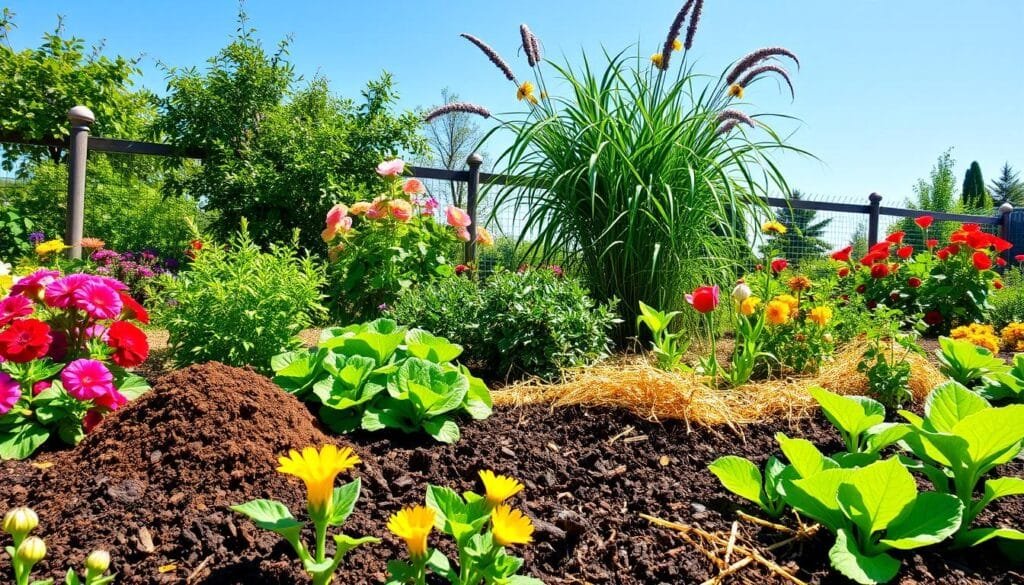
Knowing about different organic amendments helps gardeners create a thriving soil environment. This leads to healthier plants, more food, and a greener gardening practice. Whether you’re starting a new garden or keeping an old one going, using organic amendments is a game-changer.
| Amendment | NPK Ratio | Benefits |
|---|---|---|
| Compost | Varies | Boosts plant growth, increases harvest yields |
| Blood Meal | 12-0-0 to 13-0-0 | Promotes leafy greens and corn growth |
| Feather Meal | Approximately 13-0-0 | Promotes healthy plant growth |
| Bone Meal | 4-12-0 | Promotes big blooms and strong root development |
Natural Mineral Amendments for Soil Enhancement
Natural mineral amendments are key to improving raised garden bed soil. They enhance soil structure and fertility, aiding plant growth. Dolomitic limestone, for instance, raises soil pH and neutralizes acidity.
Other minerals like calcium carbonate and rock dust also boost soil for raised garden beds. They provide vital nutrients for plants, encouraging healthy growth. Calcium carbonate, for example, can be applied at 10 pounds per 1,000 square feet to counteract acidity.

Gypsum and calcitic lime are also valuable for soil improvement. They enhance soil structure, increase nutrient availability, and foster microbial activity. Adding these natural minerals to your soil can make it more balanced and fertile for your plants.
The application rates for these amendments depend on your soil type and conditions. Rock dust, for example, should be applied at about 50 pounds per 1,000 square feet. By following these rates and combining these minerals with organic soil amendments, you can create a vibrant and productive garden with healthy raised garden bed soil.
Preparing Garden Beds with Organic Materials
Using organic materials is key for a fertile garden bed. Organic gardening boosts soil health with natural materials. This includes composting and sheet mulching.
Composting makes soil better by adding nutrients and keeping it moist. Sheet mulch layers can be 3 inches of manure or grass clippings and 9 inches of straw or leaves. It can kill weeds under 12-18 inches of organic matter.
Some important things to think about when preparing garden beds include:
- Checking soil texture to find the best way to improve it
- Adding organic matter like compost or manure to make soil fertile
- Using double digging to improve soil aeration without disrupting it too much
It’s good to top dress with compost every year to keep soil healthy. Using different organic materials can help plants by increasing microbial activity. By following these steps, gardeners can make a garden bed that thrives.
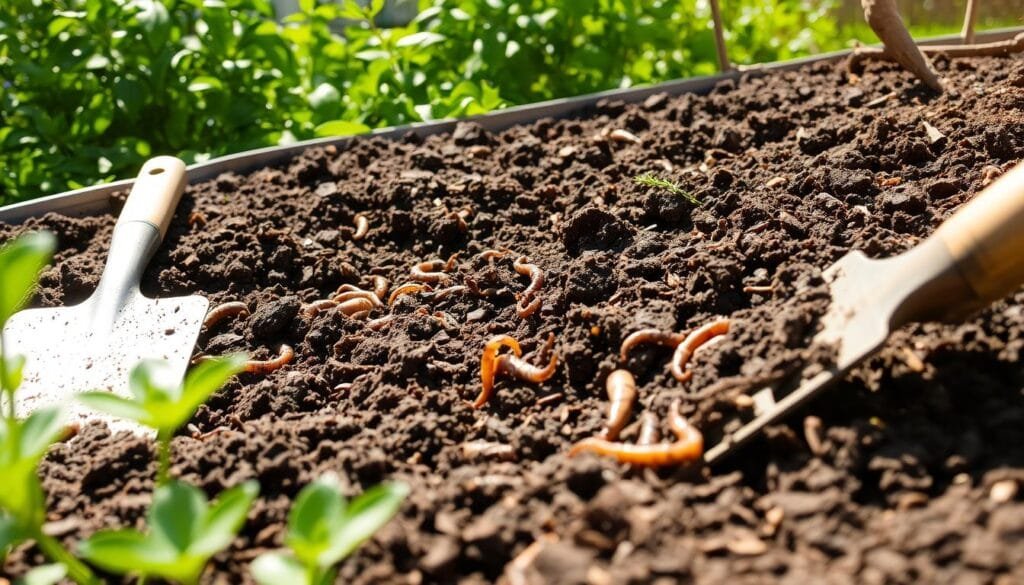
| Soil Type | Organic Matter Recommendation |
|---|---|
| Sandy Soil | 3-4 inches of organic matter |
| Clay Soil | 2-3 inches of organic matter |
| Silty Soil | 2 inches of organic matter |
Soil Testing and Amendment Selection
Soil testing is key when preparing soil for vegetable garden. It shows the soil’s pH level, nutrient content, and texture. These are vital for how to prepare garden beds for planting. To get a good sample, take soil from 10 to 15 spots in a specific area.
A soil test can tell you the best pH for most plants, which is 6 to 7. If the pH is off, you might need to add lime or sulfur. Also, having 5% organic matter in the soil is best. If it’s low, adding compost can help.
When picking amendments, consider a few things:
- Nutrient analysis to check nitrogen, phosphorus, and potassium levels
- Soil texture analysis to see the sand, silt, and clay mix
- Salinity testing to find out if there’s too much salt
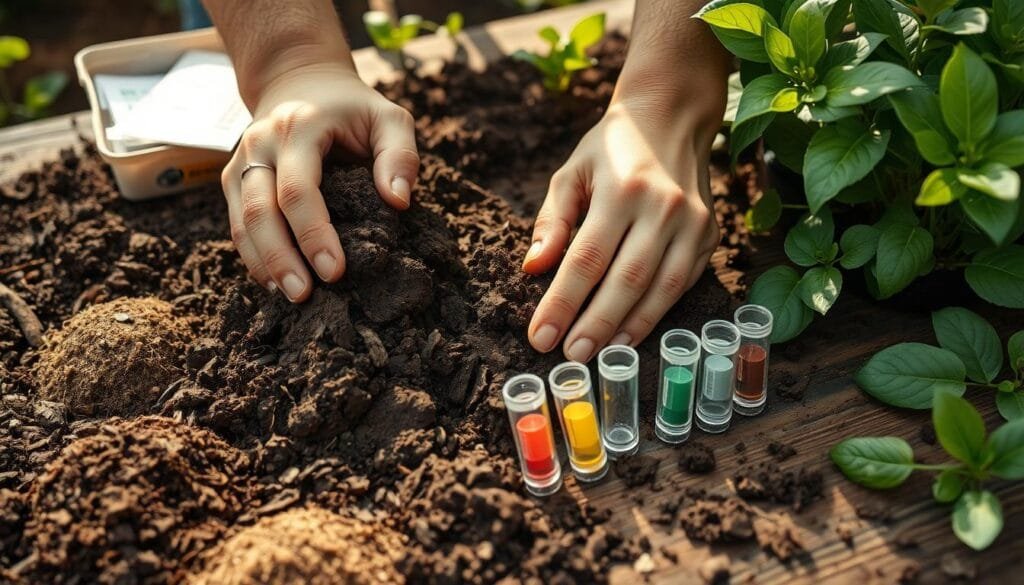
Knowing these details and choosing the right amendments can make your garden great. Whether you’re preparing soil for vegetable garden or how to prepare garden beds for planting other plants, testing and selecting amendments are critical.
| Soil Factor | Optimal Value | Adjustment Method |
|---|---|---|
| pH Level | 6-7 | Lime or Sulfur |
| Organic Matter | 5% | Compost |
| Nutrient Levels | Varies | Fertilizers |
Seasonal Considerations for Soil Amendment
For gardening beginners, knowing about seasonal soil amendment is key. Each season has its own needs for soil health and plant growth.
In spring, get your soil ready for new plants with compost or manure. This adds nutrients and makes the soil better. Summer is for keeping the soil healthy with water and mulch.
Fall is for making the soil richer with cover crops or green manures. These add nitrogen and other nutrients. By following these tips, beginners can make a strong and healthy garden.
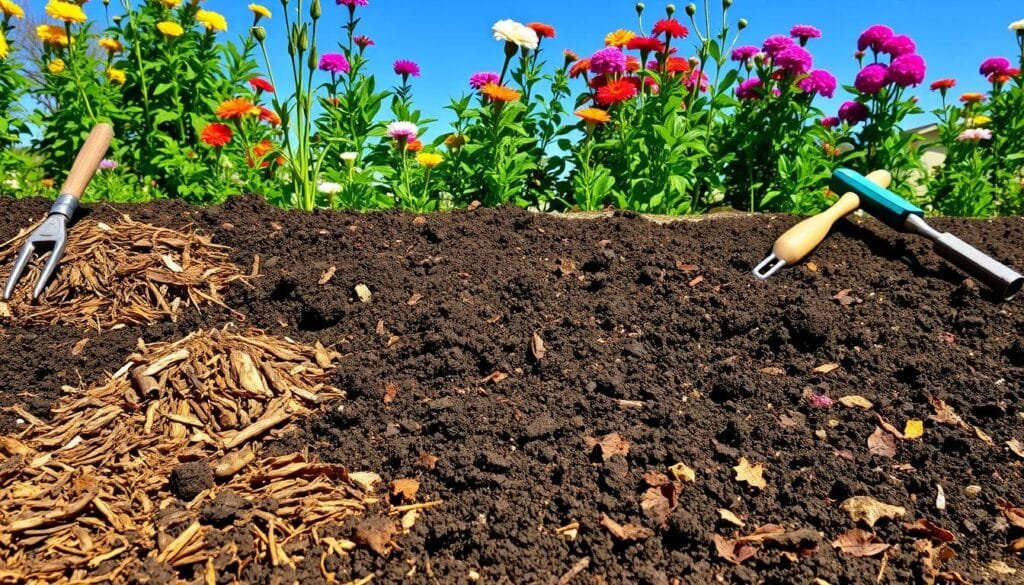
- Spring: Add organic amendments to replenish nutrients and improve soil structure
- Summer: Maintain soil health through regular watering and mulching
- Fall: Enhance soil fertility by incorporating cover crops or green manures
By using these seasonal tips and adding organic amendments, beginners can make a garden that’s healthy and productive all year.
Creating Custom Soil Blends for Raised Beds
Creating a custom raised garden bed soil blend can help solve specific soil problems. It also boosts soil fertility. By mixing different soil parts, gardeners can make a fertile and well-structured soil for raised garden beds.
A custom blend meets the needs of the plants you grow. Some plants need more organic matter, while others prefer a certain pH level. This way, gardeners can make sure their raised garden bed soil is perfect for their plants.
When making a custom blend for soil for raised garden beds, consider these key parts:
- Compost or other organic matter to add nutrients and improve soil structure
- Peat moss or coconut coir to help retain moisture
- Perlite or vermiculite to improve drainage
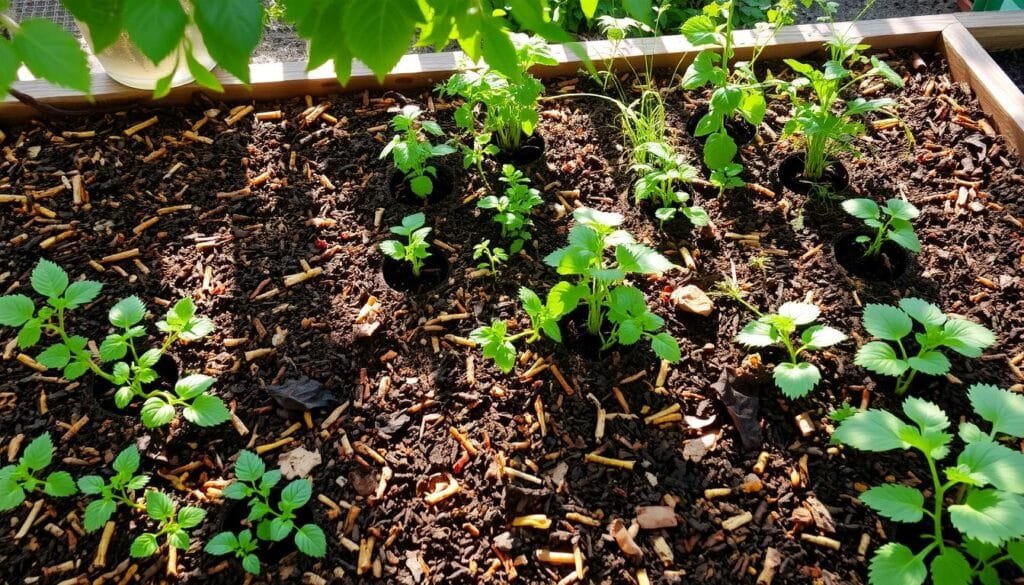
By making a custom blend, gardeners can control their raised garden bed soil. This leads to healthier plants, better yields, and a successful gardening experience.
Maintaining Long-term Soil Health
Organic gardening means knowing a lot about soil health. It’s key to check soil often and fix any problems. Soil tests help see pH levels, nutrient levels, and how microbes work.
In organic gardening, keeping a balanced ecosystem is important. Crop rotation helps by adding nutrients and stopping diseases. For example, legumes can give corn up to 35 pounds of extra nitrogen per acre. Also, preparing garden beds well is key for plants to grow well.
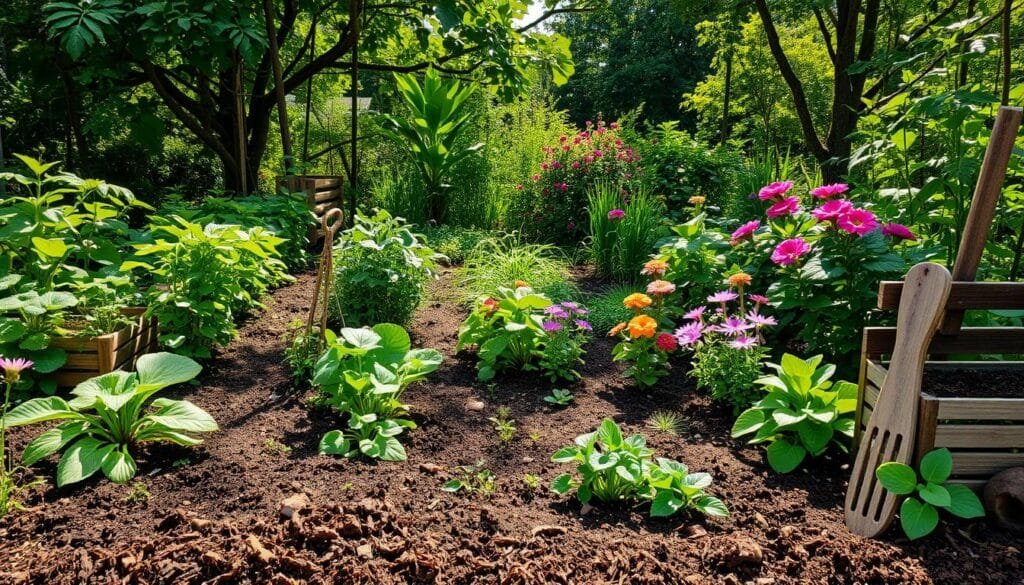
- Regular soil testing to identify pH imbalances and nutrient deficiencies
- Implementing conservation tillage practices to reduce soil erosion and promote soil structure
- Using organic fertilizers to minimize chemical residues and promote soil vitality
- Planting cover crops to enhance soil health and reduce erosion
Monitoring Techniques
Checking soil health often is vital to catch problems early. Soil tests give insights into soil conditions. This helps gardeners make smart choices for garden bed preparation and keep the ecosystem balanced.
Adjustment Strategies
When issues are found, gardeners can fix them to keep soil healthy. This might mean changing pH levels, adding organic matter, or using conservation tillage. By being proactive, gardeners can create a healthy environment for plants and support organic gardening.
Troubleshooting Common Soil Issues
When preparing soil for a vegetable garden, you might face issues like nutrient shortages and pH imbalances. It’s key to know how to spot and fix these problems. You can use organic amendments and other methods to do so.
First, test the soil and check its pH level. A soil testing kit can help find any nutrient gaps or pH issues. After getting the results, you can add compost or manure to the soil. This will boost its fertility and structure.
Here are some tips for solving common soil problems:
- Check the soil’s pH level and adjust it if necessary
- Add organic matter such as compost or manure to improve soil fertility
- Use natural mineral amendments to enhance soil structure and porosity
By using these tips and organic amendments, you can make your soil perfect for growing vegetables and other crops. Always test the soil before planting. Also, add organic matter every year to keep the soil healthy and fertile.

| Soil Type | pH Level | Organic Matter |
|---|---|---|
| Clay | 6.0-7.0 | 5-10% |
| Sandy | 6.0-7.0 | 5-10% |
| Silty | 6.0-7.0 | 5-10% |
Organic Amendments for Specific Plant Types
When it comes to garden soil preparation, gardening beginners often wonder which organic amendments are best for their specific plants. Different plants have unique needs. Using the right amendments can greatly improve their growth and health.
Vegetables
For vegetables, compost and manure are highly beneficial. They improve soil structure and increase nutrient availability. Tomatoes and peppers, for example, benefit from calcium-rich amendments to prevent blossom-end rot.
Flowers
For flowers, bone meal and fish emulsion are great. They provide essential nutrients for growth and blooming. Roses and carnations, which need lots of phosphorus, benefit greatly from these amendments.
Herbs
Herbs like basil and mint do well with compost tea and worm casting. These amendments improve soil fertility and support root growth. They’re perfect for herbs that need well-draining soil.
By choosing the right organic amendments, gardening beginners can create a thriving garden. This garden requires minimal external inputs. With proper garden soil preparation, gardeners can enjoy healthy plants and reduce environmental impact.
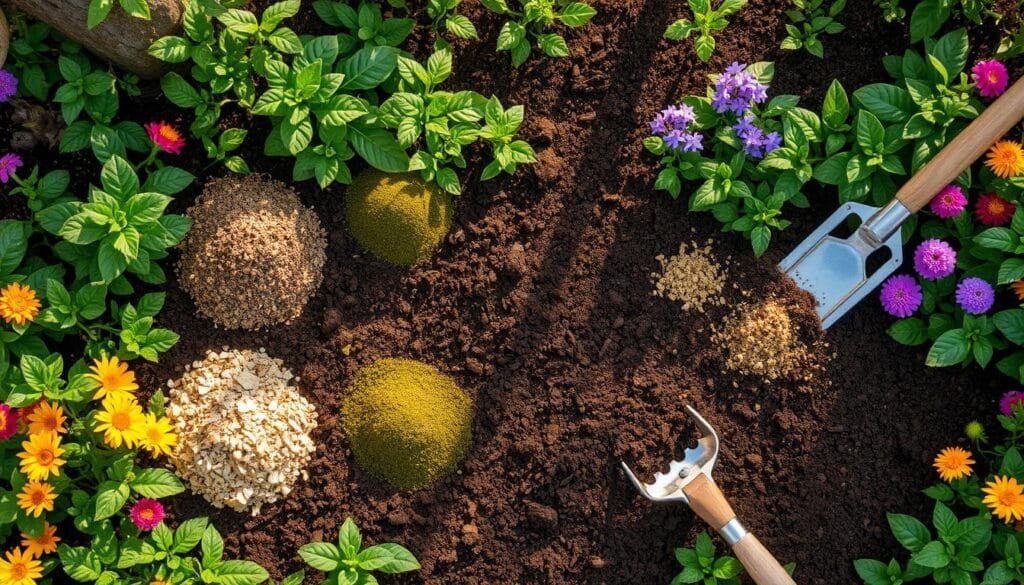
| Plant Type | Recommended Organic Amendments |
|---|---|
| Vegetables | Compost, manure, calcium-rich amendments |
| Flowers | Bone meal, fish emulsion, phosphorus-rich amendments |
| Herbs | Compost tea, worm casting, well-draining soil amendments |
Sustainable Practices in Soil Management
Using organic gardening and good garden bed preparation is key for keeping soil healthy for a long time. Sustainable farming is all about growing food in a way that’s good for the planet. It uses organic amendments and saves soil, helping to keep land productive and diverse.
Some big pluses of sustainable soil care include:
- Soil gets more fertile and holds more organic matter
- Agricultural land becomes more productive and healthy
- Soil can hold more water and keep it better
- Less soil erosion and fewer nutrients lost
The Intergovernmental Technical Panel on Soils (ITPS) says soil health means it can keep producing food and services. By using organic gardening and garden bed preparation, farmers can make soil better, grow more food, and harm the environment less.
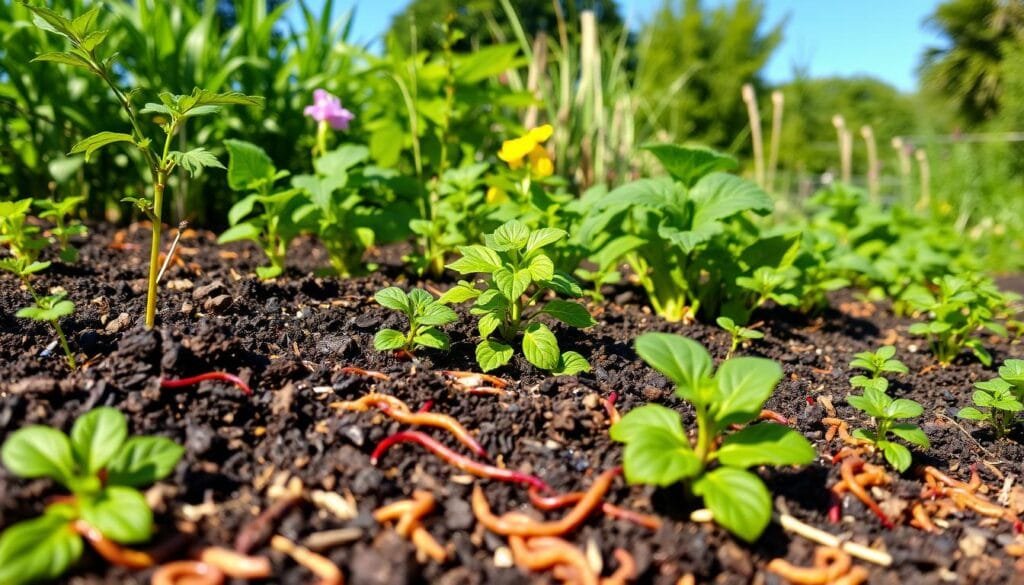
Research shows that using sustainable methods can make crops grow better without hurting the environment. For instance, planting cover crops and using mulch can stop soil from washing away. This makes the soil stronger and better at holding water. Also, organic gardening and garden bed preparation help keep water and nutrients in the soil, making crops healthier.
| Soil Management Practice | Benefits |
|---|---|
| Organic gardening | Soil gets more fertile, crops grow better, and the environment is less harmed |
| Garden bed preparation | Soil holds water better, less erosion, and soil health improves |
| Cover crops and mulch | Less erosion, soil stays stable, and water infiltration improves |
Conclusion: Nurturing Your Garden’s Foundation
The secret to a thriving garden is in its foundation – the soil. Using organic raised garden bed soil and amendments unlocks your plants’ full growth. This creates a sustainable, healthy garden ecosystem.
By adding compost, manures, and natural materials, the soil for raised garden beds becomes rich and retains moisture. This supports strong plant growth.
Keeping the soil healthy is a rewarding task. It needs attention and understanding of soil’s complex relationships. Regular soil tests, crop rotation, and adding diverse organic matter help.
By focusing on your garden’s foundation, you’ll see amazing results. Your garden will have lush plants, plenty of harvests, and a lasting balance. This will keep your green oasis thriving for years.

